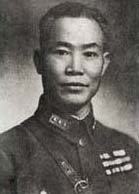Chen Cheng
Chen Cheng 陳誠 | |
|---|---|
 General Chen Cheng | |
| Nickname(s) | Little Generalissimo |
| Allegiance | |
| Years of service | 1924 - 1950 |
| Rank | General |
| Unit | 11th division |
| Commands | 18th Army 11th Division |
| Battles/wars | Northern Expedition Encirclement Campaigns Battle of Shanghai Battle of Wuhan Battle of Changsha Battle of Yichang Burma Theatre Chinese Civil War |
| Awards | Order of Blue Sky and White Sun |
| Other work | Politician |
Template:Chinese-name Chen Cheng (traditional Chinese: 陳誠; simplified Chinese: 陈诚; pinyin: Chén Chéng; January 4, 1897 - March 5, 1965), was a Chinese political and military leader, and one of the main Kuomintang (KMT) commanders during the Second Sino-Japanese War and the Chinese Civil War. After moving to Taiwan at the end of the Civil War, he served as the Governor of Taiwan, Vice President and Premier of the Republic of China. He represented the Republic of China in visits to the United States. He also helped to initiate land reforms and tax reduction programs that caused Communism to become unattractive in Taiwan, where peasants were able to own land. His good reputation endures even to today. His alias was Chen Tsyr-shiou (traditional Chinese: 陳辭修; simplified Chinese: 陈辞修; pinyin: Chén Cíxiū).
Early life
Born in Qingtian, Zhejiang, he graduated from Baoding Military Academy (保定軍校) in 1922, and entered Whampoa Academy two years later. It is here where he met Chiang Kai-shek for the first time, who was an instructor at the Academy. Chen later joined National Revolutionary Army to participate in the Northern Expedition.
Rise in the military
During the Northern Expedition, Chen displayed his excellent leadership ability. Within a year of conquest, he was promoted from commanding battalions to divisions already.
Later after the expedition, Chen became active in the wars against warlords. His successes in these battles allowed him to be promoted again, this time to the commander of the 18th Army.
Anti-Communist campaigns
Beginning in 1931, Chen was assigned the task of suppressing the Red Army. In various campaigns searching for the main force of Red Army, Chen's units experienced heavy casualties. In the fifth campaign against the Communists, he finally managed to defeat them, forcing the Red Army to launch their epic Long March.
Campaigns against the Red Army came to an end after the Xi'an Incident, which Chiang and his staffs were forced to agree in cooperation with the Communists against the invading Japanese Army.
Wartime
During the Battle of Shanghai he was one of the top military assistant of Chiang Kai Shek, it was his idea to seek a decisive action in the south rather than confront the Japanese in Northern China where nationalist troops were in poor condition and lacking transporting vehicles. After the fall of Shanghai and Nanjing Chen moved to Hubei to command the Battle of Wuhan during the year of 1938. Wuhan was the provisional headquarter of the Chinese Army. The Japanese however, managed to defeat the Chinese under heavy losses and captured Wuhan on October 25, 1938.
In latter years of the war, Chen went on to command the Battle of Changsha, Battle of Yichang and Battle of West Hubei. In 1943, he was appointed the commander of the Chinese Expeditionary Force in Burma theatre until he was replaced by Wei Li-huang due to illness.
After the Second Sino-Japanese War, Chen became the Chief of the General Staff and commander-in-chief of the navy. He followed Chiang's orders and began to raid the "liberated" areas by Red Army which launched the Chinese Civil War.
In 1947, Chen moved to Manchuria to command the Nationalist force against the Communists in that area. He made the crucial mistake to dissolve the local security regiments, because they served in the Manchukuo Imperial Army, as result the total nationalist strength in Manchuria fell from 1.3 million to less than 480,000. He also dimissed some of the most capable nationalist commanders, such as Du Yuming, Sun Li-jen, Zheng Dongguo and Chen Mingren. As a result he suffered a series of major defeats and Chiang Kai-shek replaced him with Wei Lihuang as commander-in-chief of Manchuria and Fan Hanjie as deputy commander-in-chief and director of Jinzhou forward command center. Chen took a sick leave in Taiwan to treat his chronical stomach ailment.
In Taiwan
Chiang appointed Chen as the Governor of Taiwan in 1949 to plan that Taiwan will be one of the strongholds of the Kuomingtang. After the Nationalist force retreats to Taiwan, Chen went on to hold key civilian government positions such as Vice-Executive of the Kuomintang, Vice President and Premier of the Republic of China.
In his years at Taiwan, he introduced various land, economic reforms and developed the reconstruction of Taiwan. He kept Taiwan off communists where farmers actually owned land they tilled. The original landlords were issued stocks from enterprises which belonged to the government. He was also credit to launch several earlier construction projects. One was the Shimen Reservoir which reduced the flooding while increased rice crop production.
He was one of the popular governors. Chen died of hepatic tumors in 1965. His cremated remains were moved to Fo Guang Shan, Kaohsiung County in August 1995.
His son was involved in politics and ran for president unsuccessfully.
Family
He married Tan Xiang, the daughter of Tan Yankai, daughter of former Chinese Premier. Chen and Tan's eldest son, Chen Li-an, also became a politician and ran unsuccessfully at Presidential elections.
See also
Reference
- Dupuy, Trevor N. The Harper Encyclopedia of Military Biography, New York, 1992
- http://www.generals.dk/general/Chen_Cheng/_/China.html
- Ministry of National Defense R.O.C[1]
- US Naval War College
- http://cgsc.leavenworth.army.mil/carl/download/csipubs/bjorge_huai.pdf
